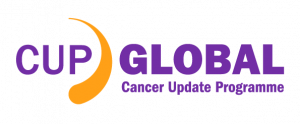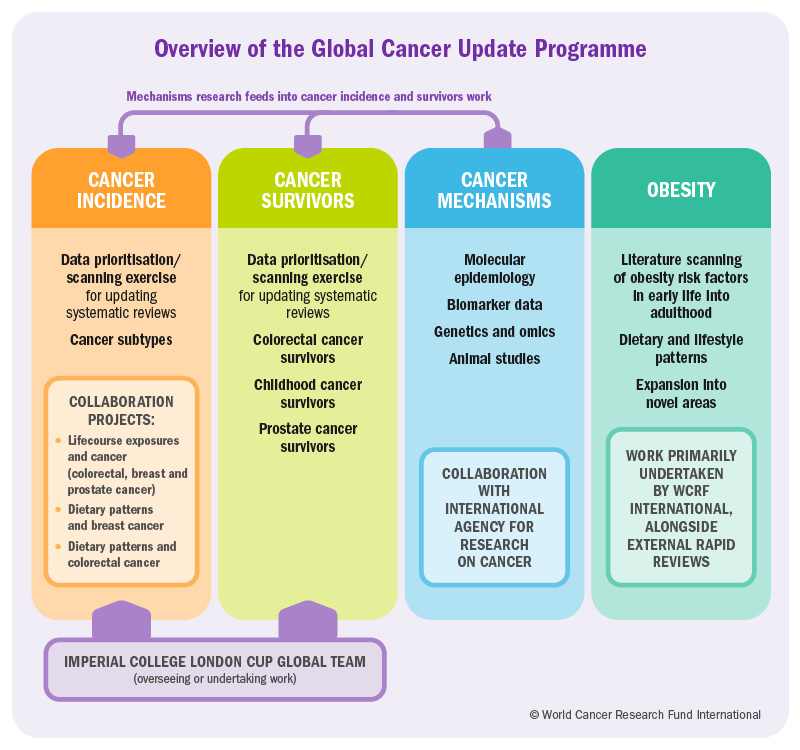 World Cancer Research Fund International’s Global Cancer Update Programme analyses global research on how diet, nutrition and physical activity affect cancer risk and survival.
World Cancer Research Fund International’s Global Cancer Update Programme analyses global research on how diet, nutrition and physical activity affect cancer risk and survival.
It’s produced in partnership with American Institute for Cancer Research, World Cancer Research Fund in the UK and Wereld Kanker Onderzoek Fonds in the Netherlands.
> Latest research
> Introducing CUP Global (watch our launch webinar)
> A new direction
> Key aims
> Future research goals
> Use of the CUP Global logo
> Expert Reports
Download a copy of the CUP Global Strategy 2022–25

In December 2022, we published a comprehensive analysis of existing research. It found strong evidence that physical activity can improve quality of life following a breast cancer diagnosis.
> Read more about the analysis here
In October 2022, we published a major review of existing research into the links between weight, diet, physical activity and the risk of death after a breast cancer diagnosis.
The review found strong evidence that a higher body weight after a breast cancer diagnosis increases a woman’s risk of death. It found some limited evidence that doing more physical activity lowers her risk of death.
> Read much more about the findings here
This research programme has built up the largest database of global cancer prevention research in the world, housed at Imperial College, London. It’s the only authoritative scientific resource of its kind, trusted by oncology experts, researchers and health professionals worldwide, and evaluated by an independent panel of leading cancer experts.
> View the Global Cancer Update Programme Panel
The programme’s database contains nearly 12,000 papers on cancer prevention and survival, with contributions from over 140 scientists in more than 17 different countries.
The findings from the programme are then used to update our Cancer Prevention Recommendations, which ensures that everyone – from policymakers to members of the public – has access to the most up-to-date information on how to minimise the risk of developing cancer.
To understand more about CUP Global, watch the webinar below held on 13 October 2022 to launch the work.
This includes a fascinating series of presentations from the new CUP Global Panel and other experts.
Over the last three decades, the science on how diet, nutrition and physical activity affect the risk of cancer has evolved.
As our understanding of cancer itself has also improved, it’s important to consider how to adapt our research programme to address the future challenges in cancer prevention and survival.
New ways of studying the evidence and exploring the risk factors that may influence cancer are in constant development – World Cancer Research Fund International intends to stay at the forefront of this research.
In 2020–21, experts assessed every aspect of the existing programme. Their aim was to identify and prioritise the most compelling research topics for the next phase.
This transition period also enabled us to review:
The transition period in 2020/21 enabled WCRF International to develop seven key aims for the new programme of research under the new name of the Global Cancer Update Programme (CUP Global):
In moving to a new approach, World Cancer Research Fund International has identified four key areas of research focus:
Reviewing both diet, nutrition, physical activity and cancer incidence will continue to be a core element of the work. But rather than reviewing all exposures for every cancer, we’ll focus on a systematic scan of the evidence.
This will help us to identify which topics are likely to be fruitful areas of detailed study. In addition, the reviews will be more nuanced, with outcomes examined by cancer subtype rather than considering each cancer as a single disease.
There will also be several collaborative projects to expand the work into new areas, including the impact of different dietary and lifestyle patterns and of diet, nutrition and physical activity exposures over the life course.
> Find out more about the CUP work on cancer incidence
> Who’s on the Expert Committee on Cancer Incidence?
We want to focus on the impact of diet, nutrition and physical activity on long-term health after a cancer diagnosis. This began with a series of reviews for breast cancer. Reviews on colorectal cancer and prostate cancer will follow.
There will also be specific reviews to determine the impact of diet, nutrition and physical activity on children from cancer diagnosis and into adult life. The first review will be on paediatric acute leukaemia.
> Find out more about the CUP work on cancer survivors
> Who’s on the Expert Committee on Cancer Survivorship?
We aim to develop a clearer understanding of the biological processes that underpin associations between diet, nutrition, physical activity and cancer.
This will be done by reviewing both human and experimental data and will support both the cancer incidence and cancer survivor reviews.
> Find out more about the CUP work on cancer mechanisms
> Who’s on the Expert Committee on Cancer Mechanisms?
Obesity was identified as a key risk factor for cancer in the Third Expert Report, increasing the risk of several cancers. This work aims to ensure that our Cancer Prevention Recommendations relating to obesity remain up to date, with the potential to develop more specific recommendations.
> Find out more about the CUP work on obesity
> Who’s on the Expert Committee on Obesity?
With input from an expert panel, this flagship research programme will generate the best possible answers to the most important questions related to how diet, nutrition and physical activity affect risk of, and survival from, cancer.
The goal is that these answers will benefit the public, the scientific community and the World Cancer Research Fund network.
Want to read about the CUP Global Strategy in more detail?
> Download the CUP Global Strategy
Want to use or cite CUP Global externally in presentations or printed publications?
> Get a downloadable version of the logo or request permission
The Global Cancer Update Programme was originally established as the Continuous Update Project (CUP) to answer the critical question of how diet, nutrition and physical activity impact cancer risk.
The CUP was behind the development of our groundbreaking Third Expert Report – published in 2018. The report identified many specific foods (such as processed meat) and elements of the human diet (such as alcohol) that increase or decrease the risk of one or more cancer types.
> View the world-renowned panel of experts who evaluated the evidence
> Read our Cancer Prevention Recommendations